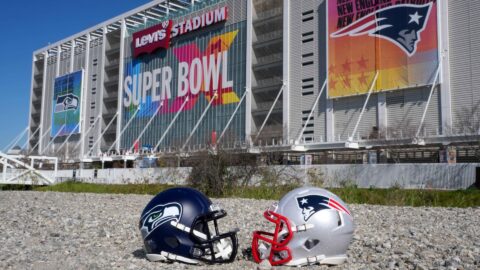BOSTON — Las Vegas and Quebec City were the only cities with ownership groups that submitted formal expansion bids to the NHL in August.
Both cities have since progressed through some early stages of the expansion process, but there’s no guarantee either city is granted a team in the near future.
“The expansion process seems to be moving forward and they had two candidates, one being Quebec and the other Las Vegas, and they both made presentations (to the board of governors). There’s a lot of content there,” Bruins owner and chairman of the NHL’s board of governors Jeremy Jacobs said during Thursday’s media day at TD Garden.
“There’s a lot of capability there. I don’t know if there’s a desire or will within the board of the existing franchises for expansion yet, but they both made very interesting proposals. Both have very legitimate arenas in place and organizations in place. There’s a capacity out there, I don’t know if there’s a will from a league standpoint.”
There are pros and cons to expansion overall, as well as the individual cities/owners involved. The league has enjoyed impressive growth in revenue and popularity since the 2004-05 lockout, and while it’s important not to interfere with that success, the current imbalance between the Eastern and Western conferences does offer some interesting expansion possibilities.
“I think it’s more important — what is the best thing for the league as a whole and what’s the best thing for Boston? Right now things — the thirty teams are pretty good for all of us, I think. Taking where we stand today most of — I feel good about where we are today. But as you framed the question there, we’re imbalanced here, we’ve got 16 teams in the East and 14 in the West.
“I would probably have to indicate that another team in the West would make more sense for us. Looking at the two locations, you have to say that Quebec looks like they are — more history there for hockey. But the presentation that was made was very compelling by those people in Las Vegas. So, there’s no clear-cut answer there, but I’m sort of giving you some of the conditions in consideration.”
It does make sense to add another team in the West, whether it’s through expansion or relocation. Seattle has been mentioned as a good place for pro hockey for a few years, but the lack of a new arena is making it difficult for both the NBA and NHL to move to the Pacific Northwest. Construction on a new arena has begun in Las Vegas, while a state-of-the-art stadium with more than 18,000 seats opened in Quebec City last month.
“I’d love to see us in the West, to be up in Seattle,” Jacobs said. “Seattle’s a natural. I’d love to see one in Houston, but we can’t get into that building. There are conditions and circumstances in each one of these that we have to take into consideration.”
Quebec City’s problem isn’t a lack of fan support or a stadium. One issue is the Canadian dollar, which has been struggling for more than a year. A weak Canadian dollar has a negative impact on the nation’s NHL franchises because player salaries, and thus the salary cap as well, are paid in United States dollars, even though a lot of these teams’ revenues are in Canadian dollars.
As of this writing, one Canadian dollar is worth 76 American cents.
“Think of it this way. The cap in Canada is $100 million now. That matters,” Jacobs said. “The last time I counted that high, it’s a lot. That’s a lot of money.”
Jacobs also said that while Quebec “has a great hockey interest, it’s also “an extraordinarily small market.”
The league wasn’t able to make it work in Quebec City during the mid-1990s and the Nordiques ultimately moved to Denver after the 1994-95 season.
READ: Patrice Bergeron talks possible Quebec City expansion >>
Thumbnail photo via Jean-Yves Ahern/USA TODAY Sports Images



